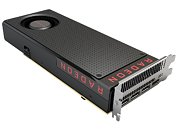Saturday, July 2nd 2016

Official Statement from AMD on the PCI-Express Overcurrent Issue
AMD sent us this statement in response to growing concern among our readers that the Radeon RX 480 graphics card violates PCI-Express power specification, by overdrawing power from its single 6-pin PCIe power connector and the PCI-Express slot. Combined, the total power budged of the card should be 150W, however, it was found to draw well over that power limit.
AMD has had out-of-spec power designs in the past with the Radeon R9 295X2, for example, but that card is targeted at buyers with reasonably good PSUs. The RX 480's target audience could face troubles powering the card. Below is AMD's statement on the matter. The company stated that it's working on a driver update that could cap the power at 150W. It will be interesting to see how that power-limit affects performance.
AMD has had out-of-spec power designs in the past with the Radeon R9 295X2, for example, but that card is targeted at buyers with reasonably good PSUs. The RX 480's target audience could face troubles powering the card. Below is AMD's statement on the matter. The company stated that it's working on a driver update that could cap the power at 150W. It will be interesting to see how that power-limit affects performance.
"As you know, we continuously tune our GPUs in order to maximize their performance within their given power envelopes and the speed of the memory interface, which in this case is an unprecedented 8 Gbps for GDDR5. Recently, we identified select scenarios where the tuning of some RX 480 boards was not optimal. Fortunately, we can adjust the GPU's tuning via software in order to resolve this issue. We are already testing a driver that implements a fix, and we will provide an update to the community on our progress on Tuesday (July 5, 2016)."

358 Comments on Official Statement from AMD on the PCI-Express Overcurrent Issue
The problem is slot power draw, not total power draw. The 960 Strix was proven to "overdraw" from the 6-pin external connector, the slot power draw stays below 50W even when overclocked...
The RX 480 has much lower peaks around 160 Watts, and therefore should be of no concern to those who accept Nvidia's previous offerings.
EDIT: lol - I didn't actually use Toms hardware as a source for power draw (don't rate too highly) then watched the video.. As for that guy on AdoredTV - as a Glaswegian, his accent was a sham. Scottish people don't talk that way - when they do, they get a punch in the mouth.
Also, this.
You are using a Total Power Consumption chart when the real issue here is the amount of power is coming through the mainboard slot, so it isn't relevant to the subject.
Thank you for dismissing the video based on the accent of the author. This methodology of establishing the accuracy of technical information on the basis of a speaker's accent should be Standard Operating Procedure.
Perhaps if I posted a Soundcloud of my voice he would take my word for it?
If you would agree that overclocking cards like the 750's and 950 SE exceeds the power specs for PCIE, then where are all the broken mainboards?
Since Nvidia cards did not brick boards with their higher power spikes, then the furor over the RX 480 is needless unless there is a bias.
AMD will likely make unnecessary changes just to mollify the uproar.Those cards routinely exceed the 75 Watt limit with it's power spikes, just like the RX 480. Yet PCI-SIG certifies all these cards---why?
Because it isn't an issue!
As I have already said multiple times dropping the consumption down a few watts isn't going to fix this, people with cheap motherboards are still going to have failures after long gaming sessions with these cards and any other high watt draw across PCI-e the 750ti's already did this in OEM units with VGA upgrades.